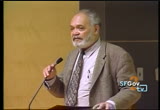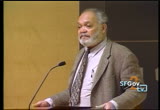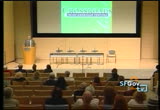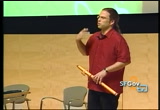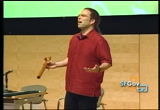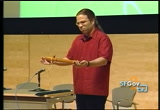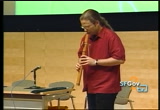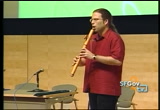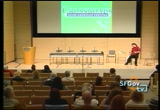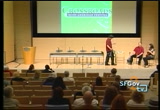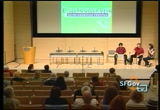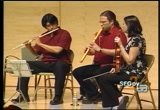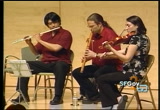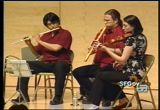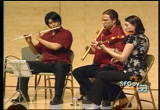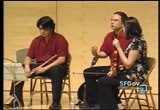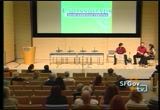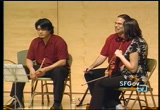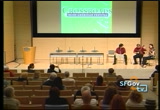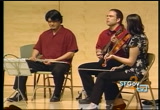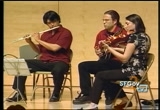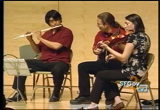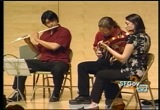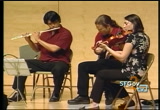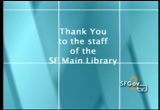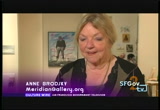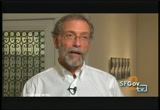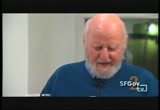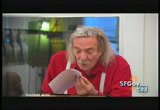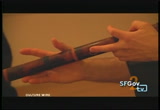tv [untitled] December 28, 2012 6:00am-6:30am PST
6:00 am
and please excuse if i manhandle the irish manner of speaking. this is a joke told to me by one of my friends. he said that an american, an irish american, was golfing with his wife on a weekend. and he hit the ball into the rough. went looking for it. all of a sudden, a leprechaun jumped up. we're back to the leprechaun theme. he said, top of the morning to you, lad. he says, you're a leprechaun. he says, yes, i am, and you have 3 wishes. three wishes? he says, yes. you have 3 wishes. i want to be a par golfer.. he says, no problem. from now on, par and under. he says, i want a porsche. he says, when you go home
6:01 am
tonight, there will be a porsche in your garage. and he says, i want a million dollars. he says, done. when you go to the bank on monday, there will be a million dollars in your account. thank you very much, i have to find my ball. so he goes looking -- hold on a minute, lad. please hold on. i see you are golfing with your wife. do you mind if i go into the shrubbery with her for an hour or so? he says, let me ask her. it's a million dollars. so he goes up and asks the wife and she says, what? you don't mind if i go in the bushes with the leprechaun? he says, no, no, go ahead. it's a million dollars. she says, i don't care about the car but a million dollars that could help us a lot. so she goes into the bushes with the leprechaun. about an hour later, they are coming out, she's adjusting her skirt, fixing her hair, and the
6:02 am
leprechaun says, thank you very much. how old is your husband? she says, he's 44. he's a little too old to be believing in leprechauns, isn't he? so that's for those who don't respect their own heritage. in addition to that idea of the cross roads of identity and the politics of identity, the other thing i had wanted to speak about for a second was the cross roads of community building. my -- i've been fortunate enough with my experiences, which have all been in the san francisco bay area, to have the ability to go and to listen to a lot of different music and to perform, to go and listen, and i can't say enough what events
6:03 am
like this do for young folks for myself who have to negotiate through the pressure of a dual identity. i can remember way back going to the irish arts festival that used to be at ft. mason and in the same day being able to hear kila and angela mcnamera. it was a sonic history lesson in a day. the best thing was, you could talk to any of the people who were there and you could have that history lesson expanded for you. being able to interact with folks like photographer karen rich, who is sitting in the audience right now, being able to interact with kong on his album, bridge across the blue, these events i really don't think that can be taken lightly. for urban american indians we have powwow which are intertribal events that revolve around a shared repertoire of songs and dances like some of
6:04 am
the singing you have heard me do here today. it's a time for people to be able to come together, not for the casinos, not for that part. talk about fighting stereotypes, that's a stereotype for us. yes, we have casinos, but that all of our culture? no. it's not all we are here to be defined by. for most people, especially in urban areas, powwows are places to go to reconnect. powwows are places you go to see people you haven't seen in a long time and to make new friends, new connections, nothing different than what's going on here, nothing difrplt than what was going on at the old festival at ft. mason. with that, i wanted to play also for you a little bit of cedar flute. if you've heard cedar flute you've heard youngblood and cedar flute has become
6:05 am
emblematic of american indian in the singular, american indian culture. i wanted to play it for you to give you an example of what might be considered traditional style because after this i'd lake to bring up two guests and play two arrangements that were created especially for this festival that bring in both the irish american and the urban indian. so this is a cedar flute song for you. (playing flute) so now that you
6:08 am
invite two guests up to perform for you, two arrangements which i made especially for today. first, rita lindall, rita and i are both in the same cohort as the music program at uc berkley and we've been saying for 4 years, we need to play music. so we finally made it happen. so, rita lindall, and then masuro koga. mas and i have been playing together for a very long time, so much so that we wore the same shirt without having to talk to each other about it. mas is in high demand both as a
6:09 am
teacher and as a session side man, having played with everybody from anthony brown's asian american orchestra to wane wallace's newest cd. who haven't you played with lately? yeah, he's played with everybody. you can find mas on a lot of different cd's from the local jazz community. this song we're going to do is an air called the brown-haired girl. when i was recording, when i was fortunate to be able to record bridge across the blue, i was telling them i got this air, i got it off the chieftan's album, i'm going to do it on the electric base. he looked at me and said, you're nuts. people are going to go crazy but if you can do it, i'll help you. he gave me this book of airs and went, figure it out, figure it out. it never quite jelled on the base but when hillary called
6:10 am
6:14 am
>> thank you very much. i guess what i want to say about an arrangement like that is that it's not meant to use the cedar flute as a bit of exotica, but what the panelists have been speaking about. it's the use of all of it together is a way of trying to address, hopefully not in a way that homogenizing anything, hopefully not in a way that takes anything away from any of
6:15 am
the traditions incorporated within it. we all come from jazz backgrounds, which is inherently about mixing in and of itself. but if you let that start to become homogenized, if you let that start to become blank, then i think you begin to suffer from this idea of cultural invisibility. who is who and what is what? i don't want to lose that in the music, just as the way the authors who formerly so eloquently spoke. that's what i'm trying to do when i put these songs to the. with that, i would like to give you the second arrangement and last song. i was taught pala singing. we tune because we care. i was taught how to sing by a man named dr. barney horner,
6:16 am
who is the great grandson of chief john grass from standing rock reservation in south dakota. one of the songs he gave me before he passed on, on indigenous people's day in 1995, was a song that he called the blue horse special. the blue horse special is the song that i have been fortunate enough to be able to play in a lot of different performance contexts. it's a song that was made by a man named matthew too bold, a very well respected elder whose wife, ellie, just recently passed on. both of them were very well respected for their singing skills. when i thought about doing an arrangement for today, the blue horse special came to mind. i thought i wonder if i can
6:17 am
6:24 am
>> just a few steps away from union square is a quiet corner stone of san francisco's our community to the meridian gallery has a 20-year history of supporting visual arts. experimental music concert, and also readings. >> give us this day our daily bread at least three times a day. and lead us not into temptation to often on weekdays. [laughter] >> meridians' stands apart from the commercial galleries around union square, and it is because of their core mission, to increase social, philosophical, and spiritual change my isolated individuals and communities. >> it gives a statement, the idea that a significant art of any kind, in any discipline, creates change. >> it is philosophy that attracted david linger to mount
6:25 am
a show at meridian. >> you want to feel like your work this summer that it can do some good. i felt like at meridian, it could do some good. we did not even talk about price until the day before the show. of course, meridian needs to support itself and support the community. but that was not the first consideration, so that made me very happy. >> his work is printed porcelain. he transfers images onto and spoils the surface a fragile shes of clay. each one, only one-tenth of an inch thick. >> it took about two years to get it down. i would say i lose 30% of the pieces that i made. something happens to them. they cracked, the break during the process. it is very complex. they fall apart. but it is worth it to me. there are photographs i took 1 hours 99 the former soviet union. these are blown up to a gigantic images.
6:26 am
they lose resolution. i do not mind that, because my images are about the images, but they're also about the idea, which is why there is text all over the entire surface. >> marie in moved into the mansion on powell street just five years ago. its galleries are housed in one of the very rare single family residences around union square. for the 100th anniversary of the mansion, meridian hosted a series of special events, including a world premiere reading by lawrence ferlinghetti. >> the birth of an american corporate fascism, the next to last free states radio, the next-to-last independent newspaper raising hell, the next-to-last independent bookstore with a mind of its own, the next to last leftie
6:27 am
looking for obama nirvana. [laughter] the first day of the wall street occupation set forth upon this continent a new revolutionary nation. [applause] >> in addition to its own programming as -- of artist talks, meridian has been a downtown host for san francisco states well-known port trees center. recent luminaries have included david meltzer, steve dixon, and jack hirsch man. >> you can black as out of the press, blog and arrest us, tear gas, mace, and shoot us, as we know very well, you will, but this time we're not turning back. we know you are finished. desperate, near the end. hysterical in your
6:28 am
flabbergastlyness. amen. >> after the readings, the crowd headed to a reception upstairs by wandering through the other gallery rooms in the historic home. the third floor is not usually reserved for just parties, however. it is the stage for live performances. ♪ under the guidance of musical curators, these three, meridian has maintained a strong commitment to new music, compositions that are innovative, experimental, and sometimes challenging. sound art is an artistic and event that usually receives short shrift from most galleries because san francisco is musicians have responded by showing strong support for the programming.
6:29 am
♪ looking into meridian's future, she says she wants to keep doing the same thing that she has been doing since 1989. to enlighten and disturbed. >> i really believe that all the arts have a serious function and that it helps us find out who we are in a much wider sense than we were before we experienced that work of art. ♪
118 Views
IN COLLECTIONS
SFGTV2: San Francisco Government Television Television Archive
Television Archive  Television Archive News Search Service
Television Archive News Search Service 
Uploaded by TV Archive on

 Live Music Archive
Live Music Archive Librivox Free Audio
Librivox Free Audio Metropolitan Museum
Metropolitan Museum Cleveland Museum of Art
Cleveland Museum of Art Internet Arcade
Internet Arcade Console Living Room
Console Living Room Books to Borrow
Books to Borrow Open Library
Open Library TV News
TV News Understanding 9/11
Understanding 9/11